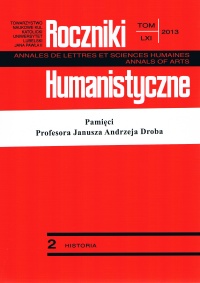„As far back as people can remember”. Memory of the past and its carriers in the country in the Lublin District in the second half of the 16th century
Abstract
Memory of the past in a society, especially one whose members were largely illiterate, was not only a bridge of its kind between the past and the present, but an important – particularly from the point of view of the perception of the practice of social life – guarantee of the truth and a sanction of the state existing in the present. It was on the range and permanence of this memory, on the efficiency of securing it and caring for it, on the effectiveness of the chronometric means used, and finally on the consciousness of its value for the „here and now”, which may be jointly defined as temporal awareness, that the conditions of the legal and economic existence of the inhabitants of the 16th century countryside depended. With a limited participation of written sources in depositing the memory of the peasant population and the development of its temporal awareness, this population first of all used relative chronology, no doubt better understood than any absolute date, as well as relative chronological means. The role of guardians of memory, sometimes formalized and formulated as a legal custom, was played by the oldest members of the community, defined as „rememberers” in inspection documents. The memory of the inhabitants of a Lublin village as a rule did not exceed twenty years, but with the use of genealogical measures also much more distant past was remembered, usually reaching the generation of the grandfather, that is comprising the span of about 60-70 years in this way.
References
Bartoszewicz A.: Czas w małych miastach. Studium z dziejów kultury umysłowej późnośredniowiecznej Polski, Warszawa-Pułtusk 2003.
Geremek B.: Człowiek i czas: jedność kultury średniowiecznej, w: Kultura Polski średniowiecznej X-XIII w., red. J. Dowiat, Warszawa 1985, s. 432-482.
Gieysztor A.: Uwagi o czasie i świadomości dziejów w Polsce średniowiecznej, ..Miscellanea Historico-Archivistica” 1 (1985), s. 143-149.
Halbwachs M.: Społeczne ramy pamięci, tłum. i wstęp M. Król, wyd. II, Warszawa 2008.
Kurbis B., O pojęciu czasu i chronologii historycznej w średniowieczu, w: Problemy nauk pomocniczych historii. Materiały z IV konferencji poświęconej naukom pomocniczym historii, Katowice-Wisła, 20-22 V 1975, red. J. Szymański, Katowice 1976, s. 59-90.
Myśliwski G.: Człowiek średniowiecza wobec czasu i przestrzeni (Mazowsze od XII do połowy XVI wieku), Warszawa 1999.
Myśliwski G.: Pamiętnicy. Ludzie sędziwi jako źródła wiedzy o przeszłości na ziemiach polskich (do końca XVI wieku), w: Europa barbarica, Europa Christiana. Studia mediaevalia Carolo Modzelewski dedicata, red. R. Michałowski [i in.], Warszawa 2008, s. 113-126.
Piesowicz K.: Rachuba czasu w społeczeństwie feudalnym i kapitalistycznym, w: Między feudalizmem a kapitalizmem. Studia z dziejów gospodarczych i społecznych. Prace ofiarowane Witoldowi Kuli, red. R. Czepulis-Rastenis [i in.], Wrocław 1976, s. 377-397.
Samsonowicz H.: Dziedzictwo średniowiecza. Mity i rzeczywistość, wyd. II popr. i uzup., Wrocław 2009.
Urban W.: Umiejętność pisania w Małopolsce w drugiej połowie XVI wieku, „Przegląd Historyczny” 68 (1977), z. 2, s. 231-258.
Copyright (c) 2013 Roczniki Humanistyczne

This work is licensed under a Creative Commons Attribution-NonCommercial-NoDerivatives 4.0 International License.





